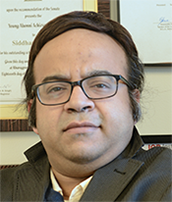|
A research team led by Siddhartha Das, associate professor of mechanical engineering at the University of Maryland (UMD), has published new work in The Journal of Physical Chemistry Letters.
The team’s Letter, “Interplay of Local Heating, Nanoconfinement, and Tunable Liquid− Wall Interactions Drive Rapid Imbibition and Pronounced Mixing Between Two Immiscible Liquids,” concerns the properties of liquids such as oil and water that do not form a homogenous mixture when added together. Such liquids are described as “immiscible.”
 The team showed that such liquid combinations can experience imbibition–that is, the process of one liquid absorbing another–as well as mixture when they are confined within a nanochannel and exposed to localized heating. The finding has implications for applications such as energy-efficient emulsion formation, oil recovery, and nanofluidic separation. The team showed that such liquid combinations can experience imbibition–that is, the process of one liquid absorbing another–as well as mixture when they are confined within a nanochannel and exposed to localized heating. The finding has implications for applications such as energy-efficient emulsion formation, oil recovery, and nanofluidic separation.
In their Letter, the team proposes a strategy whereby localized heating can be used to rapidly and efficiently bring about rapid imbibition and mixing between two immiscible liquids confined inside a nanochannel. The precise dynamics depend on the relative wettability of the two liquids compared to the nanochannel wall. If one liquid is philic and the other phobic relative to the nanochannel wall, local heating makes a particular liquid imbibe into the zone occupied by the other liquid with the philic liquid occupying near-wall locations and the phobic liquid occupying the bulk (far wall) positions.
The team also showed that the extent of imbibition depended on the thickness as well as the position of the heating zone.
Finally, the researchers demonstrated that when the two liquid systems have identical wetting interactions with the wall, enhanced mixing takes place in the presence of localized heating.
“This study establishes a remarkable low-energy technique of imbibing one immiscible liquid into another with a myriad of application possibilities,” Das said.
In addition to Das, the paper’s co-authors include UMD doctoral student Raashiq Ishraaq and postdoctoral scholar Turash Haque Pial. Das’s group has published a succession of papers detailing various breakthroughs in nanochannel research, including most recently in ACS Nano (October 2021 and April 2021), Matter, and Macromolecules.
A member of the UMD mechanical engineering faculty since 2014, Das is a Fellow of the Institute of Physics and also a Fellow of the Royal Society of Chemistry. In July 2022, he was elected a Fellow of the Institute of Engineering Technology (IET), based in the United Kingdom.
July 7, 2022
|

